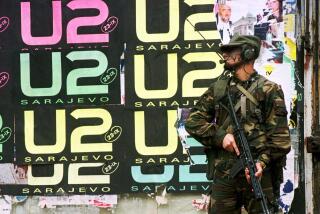Personal Perspective : The Americanization of Sarajevo’s Angst
- Share via
SARAJEVO — Spare me, God, in these singular times, from cliches, especially the old boast that Sarajevo is a spot on the map like no other, the place where East meets West. Its parrot-like repetition by the city’s promoters has had a number of consequences, none more bizarre than the apparently serious request a prewar tourist put to his guide: that he be taken, at once, to the very place where the East and West meet, so that he could have a proper photograph of himself taken there.
But let me do some justice to that perhaps apocryphal tourist’s sense of Sarajevo. An East-West nexus? Sure, why not, but it would be more accurate nowadays to call my city the meeting place of Europe and America.
The prewar annals of the local hospitality trade neatly foretell the flow of events, from the collapse of communism to what today is the making of a remarkable meeting ground between the two dominant foreign cultures in Sarajevo. Before the fighting, Sarajevo had a “Hotel Europe” and a restaurant “The American.” No other nation, no other continent, was so honored by a local hotelier or restaurateur--and I should stress that pleasure-loving, prewar Sarajevans, a city of happy, industrious nighthawks if there ever was one, set great store by their restaurants and hotels.
Europe (and by that I mean the hotel) is old, built at the end of the last century under the Austro-Hungarian Empire’s gilded dispensation. Its naming had everything to do with the Sarajevan’s touching need for European inclusion. Our guiding lights were more keen to pit liveliness and the spirit of change against the slower rhythms of the Orient than then prevailed. Afterward, larger and more comfortable hotels were built in Sarajevo, but The Europe remained an inevitable stop for the prominent visitor from beyond the Balkans.
The American (I mean the restaurant) was a product of the Titoist 1970s, a time when the Sarajevo patois teemed with the term American . Only a few Sarajevans could then brag about travel across the Atlantic, but every resident of this town where the proverbial East meets the proverbial West used the term American as shorthand for goods or services of quality, for the best to be had of anything. The restaurant thrived on the strength of the tautology: “ ‘The American’ is, well . . . American.”
The Europe is today burned out, destroyed--its outer walls stand as a false facade for rich contents that have disappeared without a trace. The American has, in a way, physically survived--as a Bosnian army mess hall. So, Sarajevo is today, among other things, not a city where Hotel Europe and The American carry on as they did before the war--but a place where America and Europe, as the controlling outside players in our calamity, meet. Ah, but what to show that tourist, the fellow with the camera intent on having his likeness taken at the much-discussed meeting point?
The meeting of Europe and America is not only an expression having something or other to do with the cutting of the Gordian knot that is Bosnia. The thing that has, in essence, brought Sarajevo closer to the New World is the belief in--a solution! When somebody is existentially imperiled and, at the same time, imprisoned in one smallish space, without any possibility of escape, the American way of thinking has a certain appeal.
If I have it right, the characteristic belief of the New World is that there is a solution for everything . Americans have no time for the unsolvable problem, or so it seems to us in this bleeding corner of the Old World.
An anecdote: An American has gone to see a production of Chekhov’s “The Three Sisters.” Soon he has had quite enough of the yearning, chorus-like refrain “to Moscow, to Moscow, to Moscow”; he whispers to his neighbor, “Why, for God’s sake, doesn’t somebody buy them the damned tickets to Moscow?”
By reasoning from the practical and technological toward the political and even the metaphysical, the American is ready--or he so believes himself to be, and invites the rest of the world to share his self-belief--to charge straight ahead at the solution. What could be more clear? The American theater-goer, fixed in his practicality and optimism, has little time for Chekhovian metaphysics. So now a little question: Is the arrival of three Balkan presidents at a sealed-off Air Force base in Ohio in late October just the American way of buying these gentlemen those damned tickets to peace (or to Moscow) in Bosnia-Herzegovina?
In Sarajevo, during our three years of existential endangerment, when no time was left for either Chekhov’s metaphysics or the tedium of domestic politics, we came to prefer the American take on the world. All I would need to do is show you how we ventured around in search of electricity and gas. A Sarajevan would drag a 100-meter hose to and fro the flat of a neighbor still hooked to the city mains, such as they were. Only the rare priority customer--the hospitals, army depots--had electricity, but the nervy and the muscular and the mechanically gifted among us managed, by hauling unimaginably long cables over the city’s rooftops to the mains of the “priorities,” to keep our lights on and our apartments occasionally warm.
Thus, a “neighbor” today in Sarajevo is the one who lets you tap into their extra-legal utilities, and not necessarily the one who lives next door. The spirit of survival! The pioneer conquest of the frontier!
Five years ago, when Yugoslavia was breaking up along its inner seams, Slovenia--the westernmost Yugoslav republic--witnessed the birth of a small political party whose key proposition was: Slovenia, the new state in the United States of America! This was more than a bit of a verbal foolery. At that moment, it was a very sober act in the dialogue with dominant Serbia, the easternmost Yugoslav republic. And why not? In this century of incredible communication technologies, why shouldn’t a Balkan republic express the wish to become an American state?
After the war, after the “solution” for Sarajevo is found, when the Europe Hotel and The American restaurant are rebuilt, we might end up with just another hotel, just another restaurant destined for destruction in some future war. The best name for either place would be “The Mars.” After all the betrayed expectations, the disgust, the tens of thousands of dead people, we Sarajevans are resigned to solving basic existential problems on our own. It is not just that we understand we will then be living in a city over whose ruins Europe and America meet. Of all neighbors, the farthest one is the best one. He is less likely to give you a headache.*
More to Read
Sign up for The Wild
We’ll help you find the best places to hike, bike and run, as well as the perfect silent spots for meditation and yoga.
You may occasionally receive promotional content from the Los Angeles Times.






